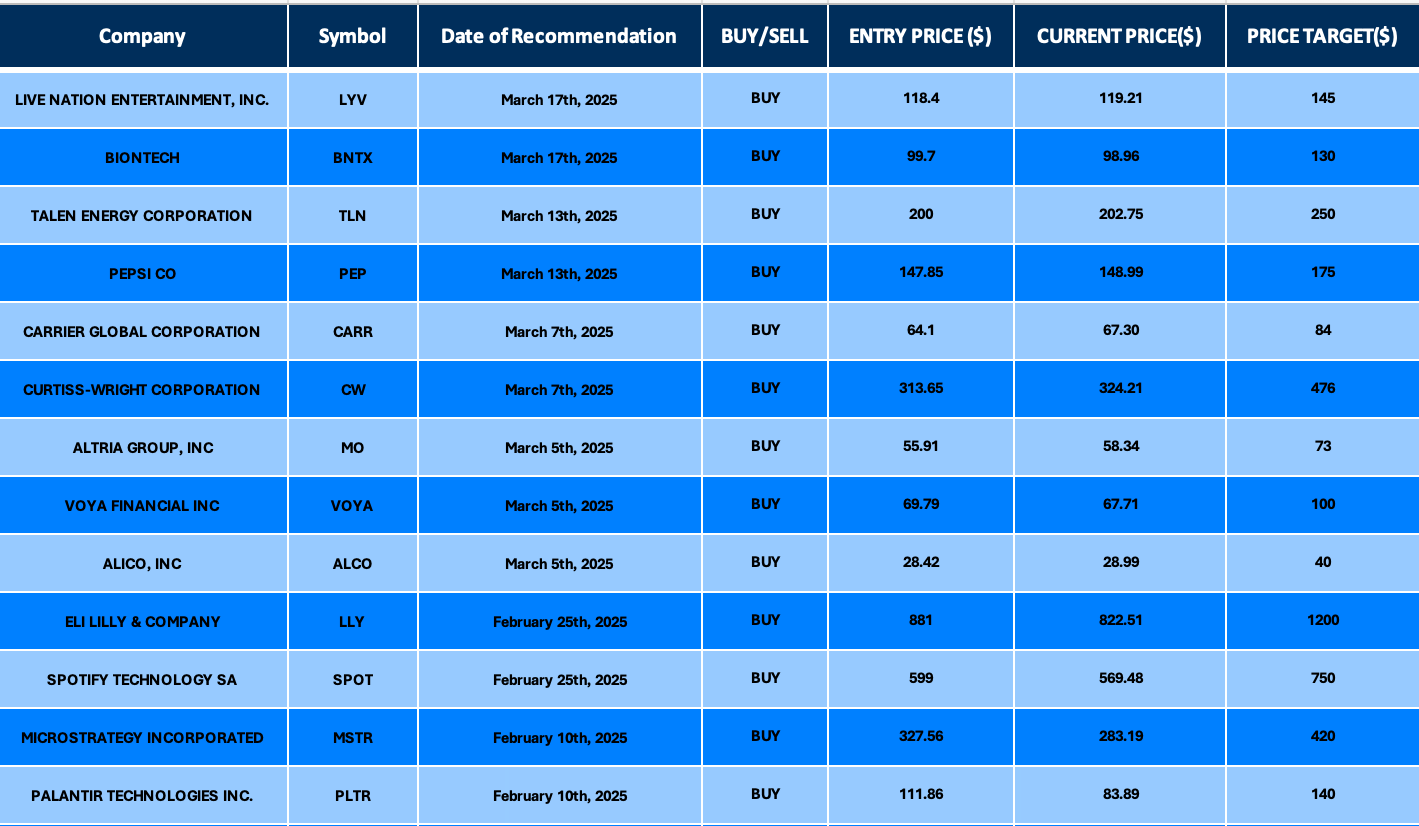
Date Issued – 27th March 2025
Preview
Markets are on edge as geopolitical tensions and trade policies dominate headlines. European futures dipped 0.6% after President Trump announced 25% tariffs on US auto imports, rattling global markets and pressuring automaker stocks. Nvidia tumbled 5.74% amid stricter Chinese energy rules, extending its 25% decline since January. Meanwhile, oil prices held steady near $74 Brent, supported by a sharp drop in US stockpiles, though rising non-OPEC+ supply clouds the outlook. In autos, Trump’s tariffs threaten global manufacturers like Jaguar Land Rover and Volvo, while favoring US-based firms like Tesla. Lastly, China’s directive to halt new deals with Li Ka-shing following his $19 billion Panama ports sale underscores deepening US-China tensions. Investors remain cautious, gravitating toward defensive plays as volatility persists.
European Futures Slip Amid Fresh US Tariff Concerns
European stock futures slid 0.6%, reflecting investor unease after President Trump imposed a 25% tariff on US auto imports. The move, which rattled global markets, also pushed the Mexican peso lower and weighed on automaker stocks like Toyota and Ford. Meanwhile, US equity futures edged higher despite heightened concerns about global trade disruptions. Trump’s broader trade strategy, including potential EU tariffs and leniency for China to secure a TikTok deal, has added to market volatility. Liquidity in S&P 500 futures hit a two-year low, signaling increased caution among institutional investors. Amid this backdrop, gold climbed toward record highs, while oil prices fell, underscoring the mixed sentiment across asset classes.
Investment Insight
The return of aggressive trade policies has reignited fears of a global economic slowdown, prompting investors to reassess risk exposure. With liquidity in US equity futures drying up and haven assets like gold gaining traction, cautious positioning is prudent. Focus on sectors sensitive to trade developments, and consider diversifying into defensive assets to hedge against heightened volatility and potential recessionary risks.
Nvidia Tumbles as China’s Energy Rules Cloud AI Outlook
Nvidia shares plunged 5.74% Wednesday, extending a broader decline triggered by concerns over stricter energy rules in China that could impact sales of its AI chips, particularly the H20 model designed to comply with U.S. export restrictions. The stock has now lost 25% from its January peak, pressured by moderating AI spending, trade policy uncertainty, and slowing growth. Technically, Nvidia broke below a pennant pattern on high volume, signaling a continuation of its downward trend. Notably, a bearish “death cross” pattern has formed, with the 50-day moving average crossing below the 200-day moving average, further reinforcing downside risks.
Investment Insight
Nvidia’s technical breakdown and mounting macro pressures highlight the importance of monitoring key price levels. Support at $105 and $96 could attract buyers, while resistance at $130 and $150 may cap any recovery attempts. The recent “death cross” signals potential for further downside, warranting caution for short-term traders. Long-term investors should assess the impact of China’s regulatory changes on Nvidia’s sales pipeline while considering potential entry points at major support levels.
Market price: NVIDIA Corp (NVDA): USD 113.76
U.S. Auto Tariffs Threaten Global Automakers and Key Trading Partners
President Trump’s decision to impose a 25% tariff on imported cars starting next week has put automakers and exporting countries on edge. Nearly half of all cars sold in the U.S. are imported, with brands like Jaguar Land Rover (100% imported) and Volvo (90% imported) among the most exposed. Major vehicle-exporting nations, including Mexico, Japan, South Korea, Canada, and Germany, are also vulnerable. Mexico led the pack in 2024, exporting 2.5 million vehicles to the U.S., followed by South Korea (1.4 million) and Japan (1.3 million). The tariffs could disrupt supply chains and raise costs across the industry, hitting both consumers and manufacturers.
Investment Insight
The auto tariffs present significant risks for global automakers reliant on U.S. sales, especially those with high exposure to imports like Jaguar Land Rover, Volvo, and Mazda. Investors should watch for potential margin compression and supply chain disruptions across affected automakers. Meanwhile, U.S.-based manufacturers like Tesla and Ford, with lower import reliance, may gain a competitive edge. Consider monitoring automaker stocks and related supply chain companies for opportunities or vulnerabilities as tariff implementation unfolds. Diversification into less trade-sensitive sectors could help mitigate portfolio risk.

Oil Holds Gains as U.S. Stockpiles Drop Sharply
Oil prices remained steady after U.S. crude inventories posted their largest drop since December, falling by 3.34 million barrels last week. Brent crude traded near $74, while WTI hovered below $70. Gasoline inventories also declined, reflecting tighter near-term supply. Oil markets have been buoyed by supply risks linked to geopolitical tensions, including U.S. sanctions on Iran and Venezuela. However, concerns over economic headwinds from escalating tariffs and rising non-OPEC+ output are tempering the bullish sentiment. OPEC+ plans to increase production next month, adding further uncertainty to the market’s trajectory.
Investment Insight
While declining U.S. stockpiles and geopolitical risks support near-term oil prices, rising supply from non-OPEC+ producers and planned OPEC+ output hikes could weigh on the market in the longer term. Investors should monitor geopolitical developments, U.S. inventory trends, and OPEC+ production decisions closely. Consider exposure to energy companies with strong cash flows and diversified operations, while hedging against potential price volatility with energy derivatives or ETFs.
China Halts Deals with Li Ka-shing Amid Panama Port Sale Controversy
China has directed state-owned enterprises to pause new transactions with firms tied to Hong Kong billionaire Li Ka-shing and his family, following CK Hutchison’s $19 billion deal to sell global port assets, including key holdings near the Panama Canal, to a BlackRock-led consortium. The move, reportedly prompted by senior officials, highlights Beijing’s unease over the politically sensitive transaction, which has drawn criticism from pro-Beijing media and Chinese regulators. Existing partnerships remain unaffected, but officials are reviewing the family’s investments in China and abroad. CK Hutchison shares rose 1.2% despite the controversy, though earlier gains faded. The deal has also garnered praise from President Trump, who previously advocated for reducing Chinese control of the Panama Canal.
Investment Insight
The escalating scrutiny over CK Hutchison’s Panama Canal asset sale underscores rising geopolitical tensions between Beijing and Washington. Investors should monitor the ripple effects on Hong Kong-listed companies with significant exposure to China, as well as potential regulatory risks. While CK Hutchison has seen short-term share price resilience, sustained uncertainty could weigh on valuations. Consider diversifying holdings away from politically sensitive industries and exploring opportunities in sectors less exposed to geopolitical headwinds.
Conclusion
Markets remain under pressure as geopolitical risks, trade tensions, and regulatory changes drive uncertainty across sectors. The imposition of U.S. auto tariffs, Nvidia’s struggles amid China’s energy rules, and Beijing’s scrutiny of Li Ka-shing’s Panama Canal asset sale underscore the increasing complexity of global markets. Meanwhile, falling oil stockpiles have offered temporary support to crude prices, though rising supply poses a challenge. With volatility likely to persist, investors should adopt a cautious stance, focusing on diversification and defensive sectors while monitoring key developments. Staying adaptive to shifting conditions will be crucial for navigating the current economic and market headwinds.
Upcoming Dates to Watch
- March 27th, 2025: US revised 4Q GDP, Mexico trade & rate decision
- March 28th, 2025: Tokyo CPI, US core PCE price index
Find below some of our Buy/Sell Recommendations. Balfour Capital Group is a distinguished global boutique investment management firm with $350 million AUM and over 1000 Clients.

Disclaimer: This post provides financial insights for informational purposes only. It does not constitute financial advice or recommendations for investment decisions.




